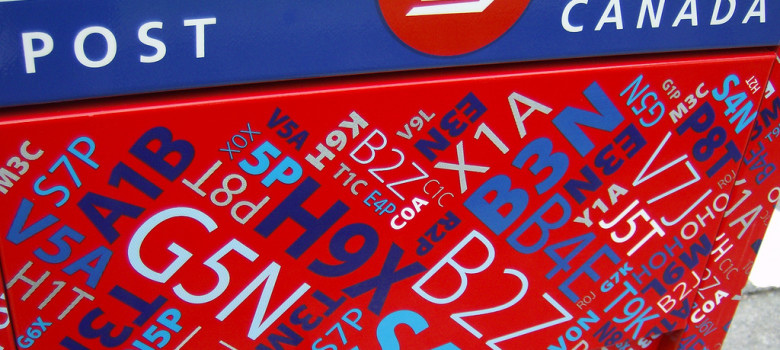Geocoder, the Ottawa-based company that managed to develop a database of postal codes using crowdsourcing techniques, has settled a controversial lawsuit brought by Canada Post. Canada Post sued in 2012 claiming intellectual property rights in postal codes. Geocoder did not copy the postal codes, however. Instead, it used crowdsourcing to develop a database containing over one million Canadian postal codes after asking people to submit their postal codes with their address. The database is freely available under a Creative Commons licence and is enormously valuable for organizations that need access to the data but are unable to pay the steep fees levied by Canada Post. While many open data advocates have long argued that this information should be available under government open data initiatives, Canada Post has steadfastly refused.
The Canada Post lawsuit has been simmering for several years, but late last month the parties reached a settlement. Canada Post has agreed to discontinue the lawsuit and Geocoder will continue to make its database available to the public. The settlement statement acknowledges:
The postal codes returned by various geocoder interface APIs and downloadable on geocoder.ca, are estimated via a crowdsourcing process. They are not licensed by geocoder.ca from Canada Post, the entity responsible for assigning postal codes to street addresses.
The settlement represents a big win for open data in Canada, as the lawsuit raised serious concerns about over-broad copyright claims given suggestions that Canada Post owned the copyright in all postal codes. As Geocoder notes, CIPPIC and Ridout & Maybee provided support in contesting the lawsuit.








crowd-sourced data + taboo power, info and vices.
security means nothing happens;
control means you make all the money/traffic
open means you’re gonna regret the digital STDs.
on the other hand, a postal-code it IS meta-data…
how long before this gets censored out?
ie: 3/6 murders in ottaw were done by a mohamaed this year,
from this postal area?
As an American, this whole dispute seems very odd. Basically all works of the US Federal government are public domain within the USA.
@John Thacker,
Laws in the USA aren’t copyrighted, but documents incorporated or referenced by them can be; the classic example is building codes that you must pay some engineering or trade society to get even though the uncopyrighted state law says you must follow them. Also Lexis/Nexis and Westlaw publish canonical legal references and claim copyright on their reference in citations. Carl Malamud and EFF are doing a great job fighting these de facto intellectual monopolies.
Actually, the USPS postal codes databases are only available by subscription via 3rd party vendors.
There is a lot of related postal code info in other Federal databases (census mapping data, USGS data) that can be used to create a relatively good geocoding solution, but they don’t keep up. My zip code was split in 2005, creating a new zip code which I’m in. It wasn’t until after the 2010 census mapping data came out that some web sites that validated zip codes in address submissions stopped telling me my zip code was invalid.
Absolutely moronic that this lawsuit was launched in the first place.
Canada is moronic and under Trudeau, the insanity will intensify.
Yes please bring back Harper. He did such a better job.
This lawsuit was luancyhed under Harper and dropped under Trudeau.
But don’t let the facts get in your way!
John A Thacker – you’re absolutely right that it’s ridiculous.
It might help if you know that Canada Post isn’t formally part of the government, but a separate corporation which the government happens to own. We do have government open-data directives in Canada right now, but it’s not entirely clear how they apply to crown corporations, or to other corporations with public monopolies (Nav Canada, which manages air and sea navigation, has been very reluctant about releasing charts and databases).
Unfortunately, while we’re making some progress, we don’t have the US tradition of Public Domain by default for the public sector. The rest of the world likes to make fun of the US for (what we see as) its silliness over issues like guns, healthcare, Donald Trump, etc., but open public data is one place where your country clearly leads the world and deserves to hold its head high.
No dumber than the members of the CSA owning the copyright on their contributions to the Electrical Code of Canada, but that was held up by the Supreme Court. No dumber than the CSA suing others for printing a better, more easily read version of the Electrical Code of Canada.
EXACTLY….!!
Ha ha. Suck it, Canada Post.
Canada post legal department really needs to get a life.
Canada post lost in court pay equity for women.
Canada post lost in court when they locked out employees then forced them back in.
Canada post ceo thinks this is Pakistan we have rules in Canada.
Since the replacement, last winter, of my front door (reach out with stepping in snow) mailbox with a “community” mailbox (150+ paces away), I would estimate the incremental value of my postal code has dropped by at least 80%.
It blows my mind that they tried to copyright zip codes. Who would actually think that zip codes are subject to copyright? That’s right up there with “you better not make a list of every city in Canada, because the names of the cities are subject a copyright.”
Pingback: Monday Pick-Me-Up « Legal Sourcery
Pingback: Minutive, Vol. 9*: Mary Meeker’s Internet Trends, IPAs (No, Not That Kind), and More
Pingback: Canada Post Drops Ridiculous Copyright Lawsuit Over Crowdsourced Postal Code | Curtis Ryals Reports
Pingback: Links 10/6/2016: Maru OS, Fedora 24 Delayed | Techrights
Pingback: Canada Post Drops Ridiculous Copyright Lawsuit Over Crowdsourced Postal Code | Deep Packet Inspection